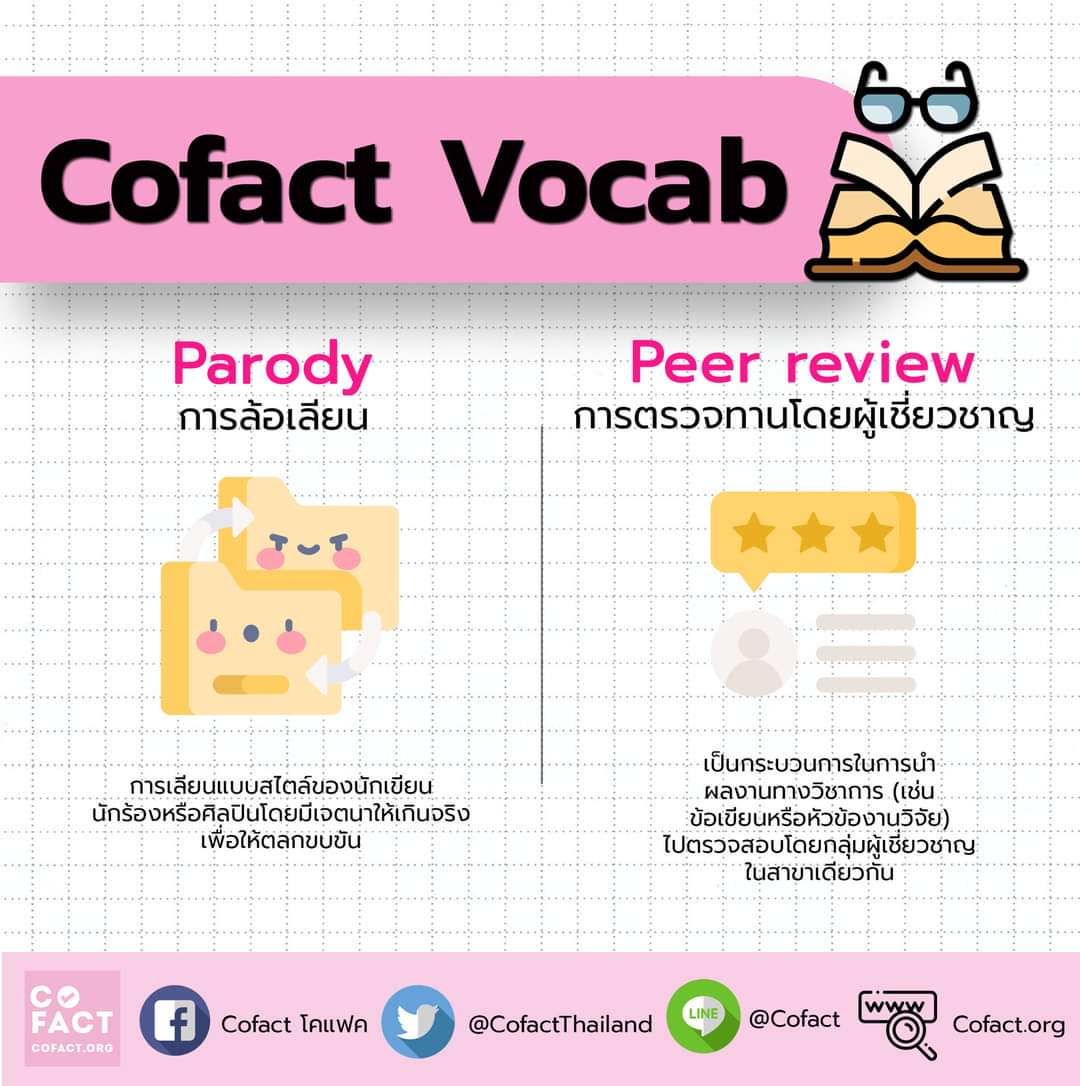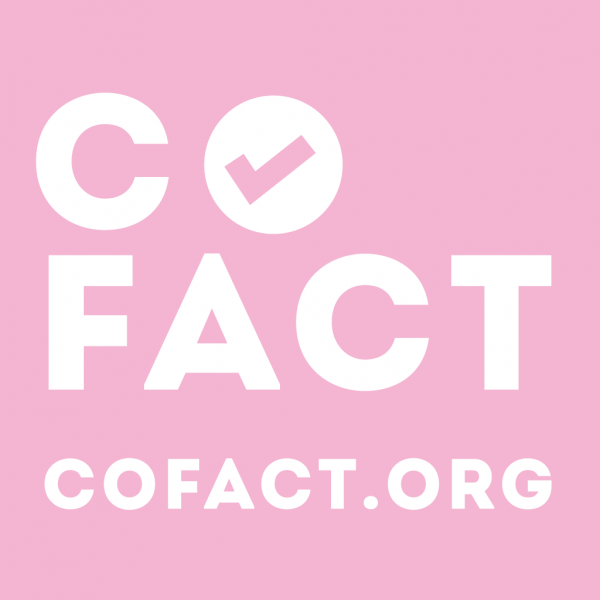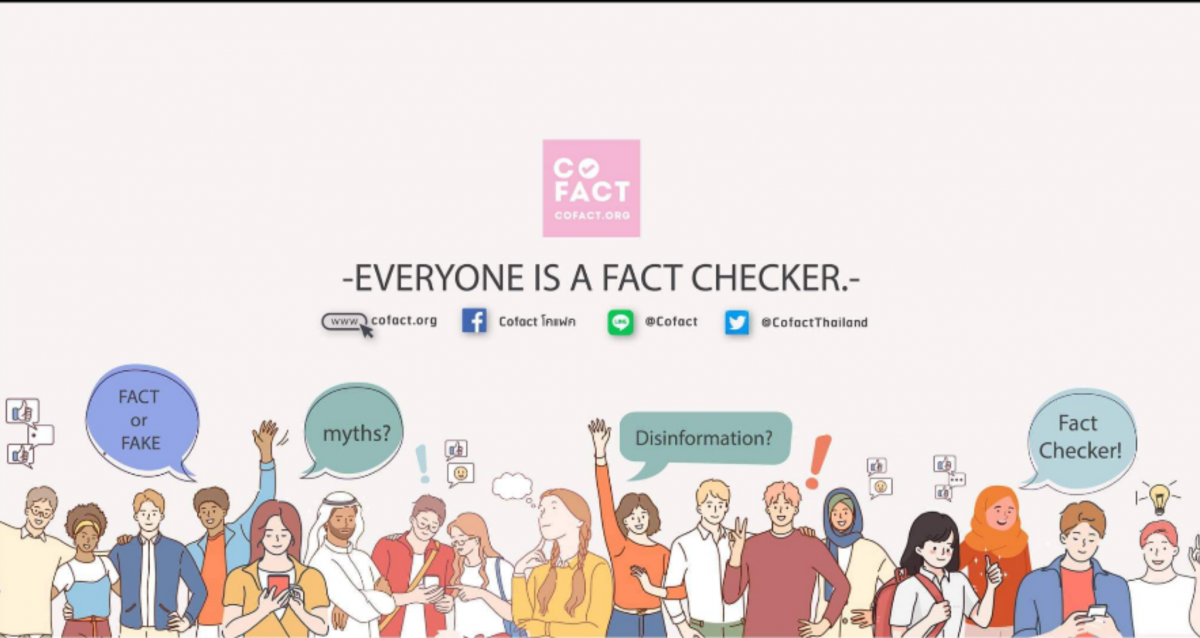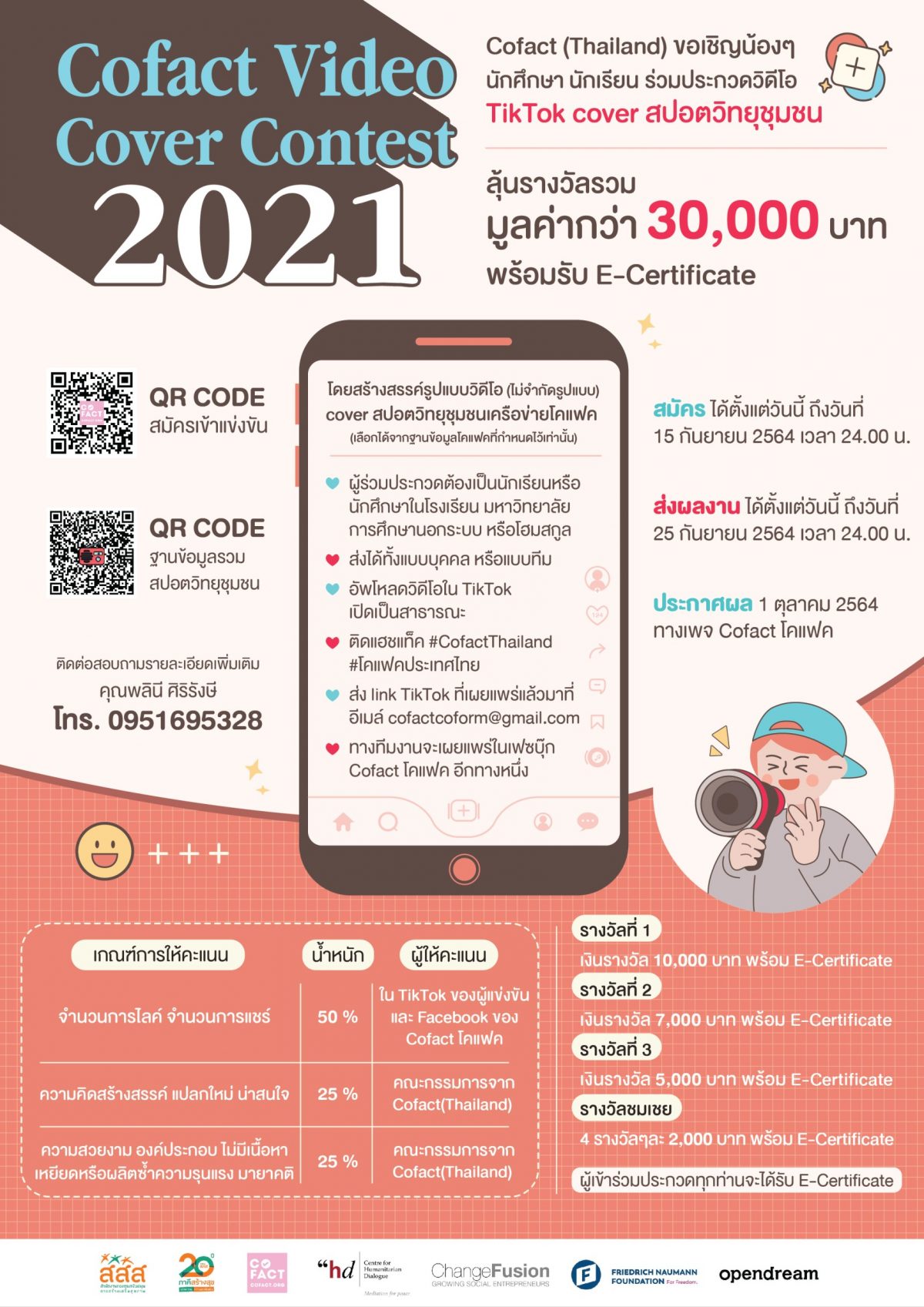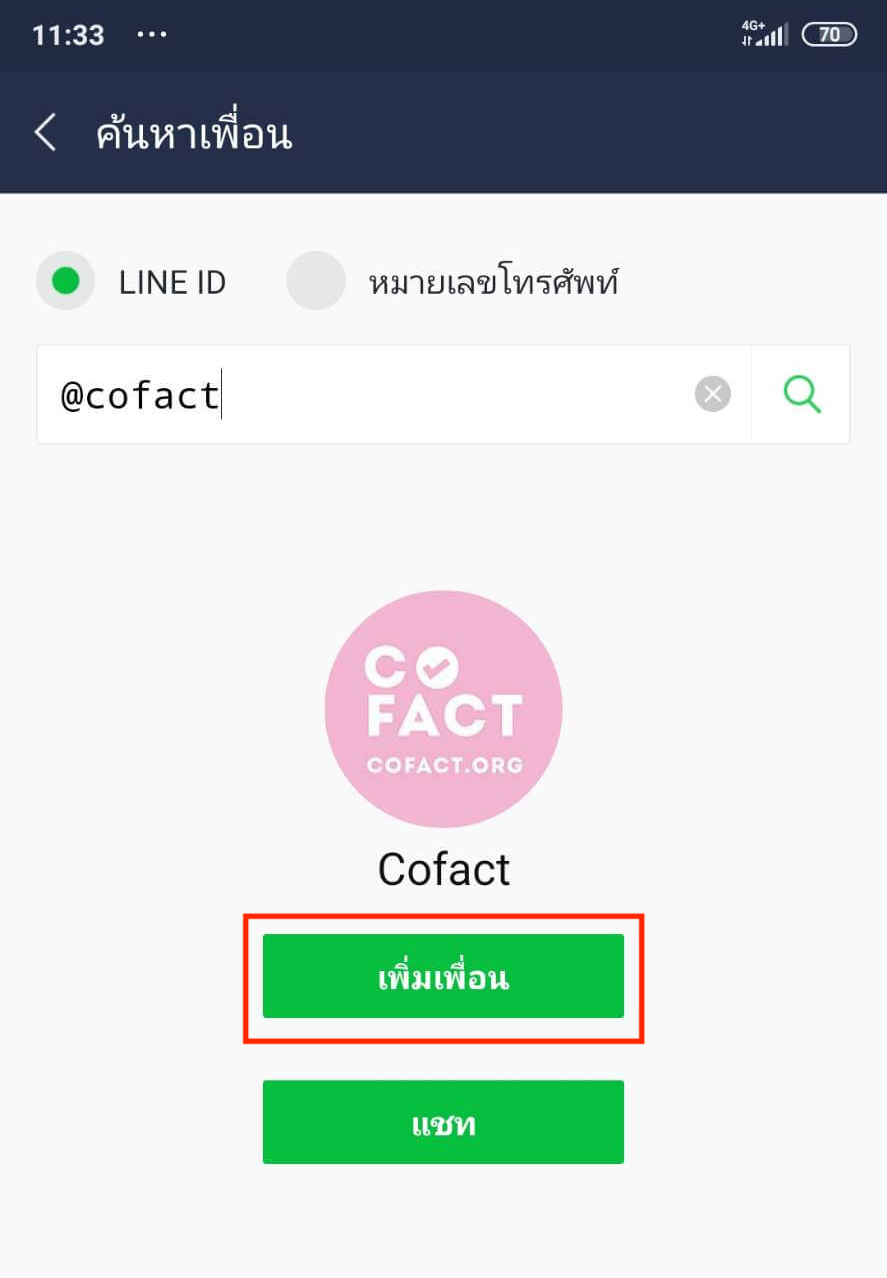จริงหรือไม่…? ผลิตภัณฑ์ AVAIL Pro-Polis สามารถต้านเชื้อไวรัสโควิด-19 ได้
เพราะ…ผลิตภัณฑ์เสริมอาหาร ในชื่อ โปร-พอลิส ไม่มีการยื่นขออนุญาต หรือยื่นข้อมูลประสิทธิผลในการฆ่าเชื้อไวรัสโคโรน่า (โควิด-19) และสกัดเชื้อไม่ให้ลงปอดตามที่กล่าวอ้าง
อ่านต่อได้ที่https://cofact.org/article/2lmqq082hbifo
จริงหรือไม่…? กรมอนามัยเตือน มีเซ็กซ์กับคนแปลกหน้าหวั่นเสี่ยงติดเชื้อโควิด19
เพราะ…กรมอนามัย แนะนำให้งดการมีเพศสัมพันธ์ เพื่อลดการแพร่เชื้อไปสู่ผู้อื่นและให้หลีกเลี่ยงการมีเพศสัมพันธ์กับคนแปลกหน้า อันจะช่วยลดความเสี่ยงในการรับเชื้อจากคนที่ไม่รู้จัก
อ่านต่อได้ที่https://cofact.org/article/3i9kpg35y9q96
จริงหรือไม่…? SMS ปลอม ส่งข้อความว่ามีเงินเข้าบัญชี 1 แสนบาท หลอกลวงเงินหายทั้งบัญชี
เพราะ…เป็นข้อความจากมิจฉาชีพ เตือน ประชาชนอย่าหลงเชื่อ
อ่านต่อได้ที่https://cofact.org/article/2rf5ai9jhjb25
จริงหรือไม่…? อย่าหลงเชื่อ กรอกรับเงินเยียวยา ม.33 ใน Google Form
เพราะ…Google Form ดังกล่าว จัดทำขึ้นโดยมิจฉาชีพเพื่อหลอกลวงขโมยข้อมูลสำคัญของประชาชน สำนักงานประกันสังคมโอนผ่านบัญชีพร้อมเพย์เลขบัตรประชาชนเท่านั้น
อ่านต่อได้ที่https://cofact.org/article/3djfqcci24c2h
จริงหรือไม่…? สถาบันคุ้มครองเงินฝากออกมาเปิดเผยข้อมูลว่า ตั้งแต่วันที่ 11 ส.ค. 64 เป็นต้นไป คนที่ฝากเงินในสถาบันการเงินภายใต้กฎหมายคุ้มครองเงินฝากจะได้รับความคุ้มครองเงินฝากในวงเงินไม่เกิน 1 ล้านบาท ต่อ 1 ราย
เพราะ…เพื่อการรักษาเสถียรภาพของระบบสถาบันการเงิน
อ่านต่อได้ที่https://cofact.org/article/3bhulgwidhis4
จริงหรือไม่…? เด็กที่เรียน online จะได้รับ internet ฟรี 2 เดือน
เพราะ… กสทช. สนับสนุนแพ็กเกจอินเทอร์เน็ตสำหรับนักเรียน ในราคา 79 บาท เป็นเวลา 2 เดือน
อ่านต่อได้ที่https://cofact.org/article/1eq1jkw012zsb
จริงหรือไม่…? สมุนไพรฟ้าทะลายโจรของปลอมกำลังแพร่ระบาด
เพราะ…อย. แนะดูฉลากผลิตภัณฑ์ต้องมีเลขทะเบียนตำรับสมุนไพรขึ้นต้นด้วยอักษร “G” และสามารถตรวจสอบการอนุญาตผลิตภัณฑ์ได้ที่เว็บไซต์หรือแอพลิเคชั่นของ อย.
อ่านต่อได้ที่https://cofact.org/article/1tgsemcglxb0y
จริงหรือไม่…? รีสอร์ตแพไทรโยคโฟลทเทล อ.ไทรโยค จ.กาญจนบุรี ได้รับคำสั่งให้เคลื่อนย้ายรีสอร์ตออกจากแม่น้ำแควน้อยเพราะรุกล้ำที่
เพราะ…อุทยานฯไทรโยค แจ้งข้อหา “ก่อสร้าง และยึดถือครอบครอง ที่ดิน และแม่น้ำ ในเขตอุทยานแห่งชาติไทรโยคโดยมิได้รับอนุญาต
อ่านต่อได้ที่https://cofact.org/article/12szxrmqg11r3
จริงหรือไม่…? ผู้ป่วยโควิด-ฉีดวัคซีน เป็นผู้ป่วยฉุกเฉิน รักษาฟรี
เพราะ…สธ.กำหนดให้ผู้มีอาการไม่ถึงประสงค์จากการฉีดวัคซีนของรัฐ เป็นผู้ป่วยฉุกเฉิน จากสถานพยาบาลที่ภาครัฐกำหนดโดยไม่เสียค่าใช้จ่าย
อ่านต่อได้ที่https://cofact.org/article/g3ng5lnr9ur
จริงหรือไม่…? ผู้ขึ้นทะเบียนสมัครเป็นผู้ประกันตนมาตรา 40 ต้องชำระเงินสมทบงวดแรก ภายใน 10 สิงหาคม จึงจะได้รับเงินเยียวยา
เพราะ…ผู้ที่จะได้รับเงินเยียวยามาตรา 40 จะต้องเป็นผู้ประกันตนอย่างสมบูรณ์ โดยการจ่ายเงินงวดแรกให้เสร็จสิ้นภายใน 10 สิงหาคมนี้
อ่านต่อได้ที่https://cofact.org/article/2pj9ma8em9cum
จริงหรือไม่…? ครอบครัวข้าราชการติดโควิดเบิกค่าห้องสูงสุด 7,500 บาทต่อวัน
เพราะ…ผู้มีสิทธิหรือบุคคลในครอบครัวติดเชื้อมีอาการรุนแรง (สีแดง) ให้เบิกได้ในอัตราเท่าที่จ่ายจริงไม่เกิน 7,500 บาทต่อวัน ตามหลักเกณฑ์ อัตรา วิธีการ และเงื่อนไข เป็นไปตามที่กำหนด
อ่านต่อได้ที่https://cofact.org/article/1m4xbv9y7savr
จริงหรือไม่…? ทีมผู้วิจัยที่ว่าฟ้าทลายโจรรักษาโควิดได้ขอถอนงาน เพราะใช้รักษาไม่ได้จริง
เพราะ…ทีมผู้วิจัยที่ว่าฟ้าทลายโจรรักษาโควิดได้ขอถอนงานกลับ เนื่องจากค่าสถิติที่คำนวณว่าได้ผลนั้นเป็นการคำนวณผิดพลาดจึงสรุปว่าฟ้าทลายโจรใช้รักษาไม่ได้จริง
อ่านต่อได้ที่https://cofact.org/article/1nooxxkg871ii
จริงหรือไม่…? องค์กรแพทย์ รพ.ขอนแก่น ออกแถลงการณ์ขอไฟเซอร์ให้บุคลากรด่านหน้า
เพราะ…บุคลากรทางการแพทย์ลงชื่อรับวัคซีนไฟเซอร์เป็นจํานวน 1400 คน แต่โรงพยาบาลขอนแก่นกลับได้รับ 700 โดส จึงมีการเรียกร้องให้จัดสรรวัคซีนไฟเซอร์ให้เพียงพอ
อ่านต่อได้ที่https://cofact.org/article/ivyj9s9gmwu4
จริงหรือไม่…? ไทยร่วมใจ เปิดให้คนอายุ 18 ปี ขึ้นไป ฉีดวัคซีนได้แล้ว
เพราะ…สามารถลงทะเบียนได้ทางโทรศัพท์ วันอาทิตย์ที่ 8 สิงหาคม 2564 หมายเลข 02-790-2855 (40 คู่สาย) ตั้งแต่เวลา 09.00 – 16.00 น. หรือจนกว่าจะเต็มจำนวน
อ่านต่อได้ที่https://cofact.org/article/2539rfc94nmn0
จริงหรือไม่…? ห้ามนําและใช้ครีมกันแดดที่มีส่วนประกอบของสารเคมีที่เป็นอันตรายต่อปะการังเข้าไป ในอุทยานแห่งชาติ
เพราะ…สารเคมีบางชนิด มีส่วนทำให้ปะการังเสื่อมโทรม หากผู้ใดฝ่าฝืน มีความผิดตามมาตรา 20 ประกอบมาตรา 47 แห่งพระราชบัญญัติอุทยานแห่งชาติ พ.ศ. 2562 ต้องระวางโทษปรับไม่เกินหนึ่งแสนบาท
อ่านต่อได้ที่https://cofact.org/article/l6iqs1402d2x
จริงหรือไม่…? ลงทะเบียนรับ ฟ้าทะลายโจร ฟรีที่ไลน์แอด fahdtam
เพราะ…ลงทะเบียนรับได้ตามไลน์แอดดังกล่าว ซึ่งเป็นของกรมการแพทย์แผนไทยและการแพทย์ทางเลือก
อ่านต่อได้ที่https://cofact.org/article/21lmbeh16bnei
จริงหรือไม่…? โควิดในสหรัฐอเมริกากลับมาระบาดรุนแรงอีกครั้ง แม้ว่าจะฉีดวัคซีนกว่าครึ่งประเทศแล้ว
เพราะ…สถานการณ์ไวรัสโคโรนาในสหรัฐฯ กำลังระบาดใหญ่ในหมู่ผู้ที่ยังไม่ได้ฉีดวัคซีน โดยเฉพาะในรัฐทางตอนใต้ของประเทศ สาเหตุมาจากการแพร่ระบาดอย่างรวดเร็วของเชื้อสายพันธุ์เดลตา ที่มีความสามารถในการแพร่เชื้อสูง
อ่านต่อได้ที่https://cofact.org/article/2j4g2u0o7fvp6
จริงหรือไม่…? กินวิตามิน C ทุกวัน จะช่วยเสริมภูมิคุ้มกัน ช่วยยับยั้งการติดโรคโควิดได้
เพราะ…ยังไม่มีหลักฐานที่ยืนยันว่าวิตามินหรือแร่ธาตุตัวไหนจะป้องกันการติดเชื้อโคโรนาไวรัสได้ แต่มีส่วนช่วยเสริมสร้างภูมิต้านทาน
อ่านต่อได้ที่https://cofact.org/article/2o8d8n1crlezt
จริงหรือไม่…? กรมอนามัย ออกคำเตือนให้สวมใส่หน้ากากป้องกันโควิด ขณะมีเพศสัมพันธ์
เพราะ…มีคำแนะนำให้สวมหน้ากากและไม่หันหน้าเข้าหากันจริง แต่โควิดแพร่กระจายทางอากาศได้และการร่วมเพศจะไม่สามารถเว้นระยะห่างได้
อ่านต่อได้ที่https://cofact.org/article/32s3yb22mbt9q
จริงหรือไม่…? ป้ายอนุทินมอบไฟเซอร์
เพราะ…มีการทำขึ้นมาจริง แต่ไม่ได้นำมาใช้ เพราะเกรงจะเป็นประเด็นทางการเมือง รวมถึงเป็นวัคซีนที่ USA มอบให้ไทย
อ่านต่อได้ที่https://cofact.org/article/f1b7g6gaa2il
